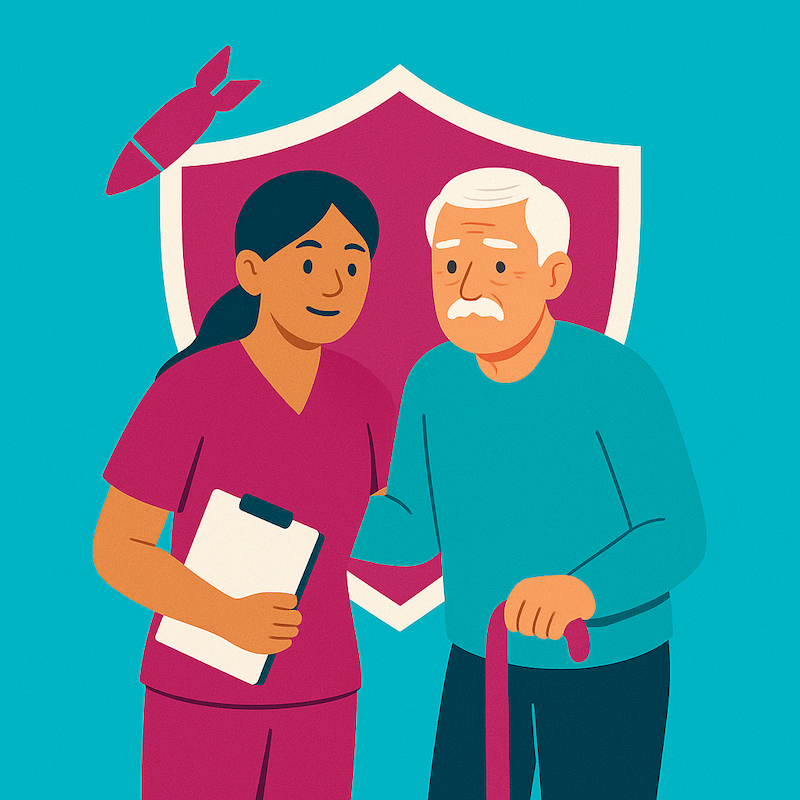The Dos and Don'ts in Caregiving
The iSavta Team | 29.01.2020
But, there are certain SOPs or rules that need to be followed diligently in order to survive your caregiving career and yes, to keep you out of trouble. Taking care of the elderly is not that easy but if you are passionate enough and make caregiving your life’s mission, you have to be guided with these Do’s and Don’ts in Caregiving:

DO'S:
Be Patient - As we’ve mentioned above, that’s the number one requirement in Caregiving. If you don’t have it as your number one positive trait, then you better quit before you even think about being a Caregiver.
Keep a Positive Attitude and Thinking - There will be mishaps, near-death situations, sleepless nights and unforgivable mistakes but always keep your cool and always find a solution. It is important not to give in to stress and panic. Know when and where to ask for help if you think you cannot handle the situation alone.
Talk Less, Listen More - They need physical help, yes. But most of them need someone to listen to them, especially if they are still well and able. They just need a companion who would be interested to listen to their stories. Remember, they love to talk about their life and what they went through. Always listen to them, engage them and show them that you are interested. And trust us, there are a lot of things that you can learn from them.
Communicate with their family and doctors - Any issues or concerns regarding your patient, you have to let the family as well as the doctors know. There are situations that can be blown out of proportion and it will be no one’s fault but yours. You are the first in line because you are the immediate responder. If you happen to see and feel something unusual with your patient’s behavior, let the family keep in the loop and do not decide things on your own.
Follow their wishes unless it’s dangerous for them - Always remember that you are a Caregiver, not a dictator. Any final decision should come from your patient because it’s their right. Unless they care not capable of deciding for themselves then the immediate family should do the call. Sometimes, elderly patients have demands that may put them in danger. If this happens, you have to do your best to explain to them the possible outcome. If that wouldn’t work, then it’s time for the family to get involved.
Treat them as Family - Be a constant companion and earn their trust. This is the only way to make your life easier as a caregiver. Once you have their trust, they will not make it difficult for you. They would eat what you prepare for them, they will take their medications and even put on the adult diaper when you tell them to. Also, you should learn to trust them as well. Let them do the things that they are still capable of doing. You can be there to assist but let them feel as independent as possible. It will make them feel more useful and alive.
DON'TS:
Don’t let them see you anxious or angry - You are human and it’s pretty normal to get frustrated, anxious and angry. You are also allowed to cry your heart out or shout your lungs out to shake off those emotions. But, never ever let your patient see you in those situations. It will make them feel bad about themselves. If burn out happens, get yourself some fresh air, request a day off and do something nice for yourself.
Don’t act as their Doctor - Leave all the medical decisions to the medical professionals. Do not administer medications without the doctor’s advice. A medication as simple as paracetamol can cause a problem if not taken properly. Some medications are contraindication to some other medicines. Only a medical professional can understand fully the condition of your patient.
Don’t Overstep - Family matters are private matters. You may not want to get involved with this no matter how close you are to your patient and the family. If you’ll be asked for an opinion on the matter, then politely respond with truth. When it comes to your patient’s well-being, you are expected to do what’s best for them and that includes not stepping over a boundary when it comes to their family.
Do not violate their privacy - Always treat your patient with dignity even if they are not capable of upholding theirs. Always make sure they are fully covered and looks dignified no matter what physical state they are. Avoid rummaging through their belongings without their permission or even eavesdrop if they are talking on the phone or to their family members.
Do not try to be perfect - You are not. Period. But as long as you know you did your best, you’ll never get overwhelmed with guilt whatever happens. Learn to own up to your mistakes and never let that happen again.











